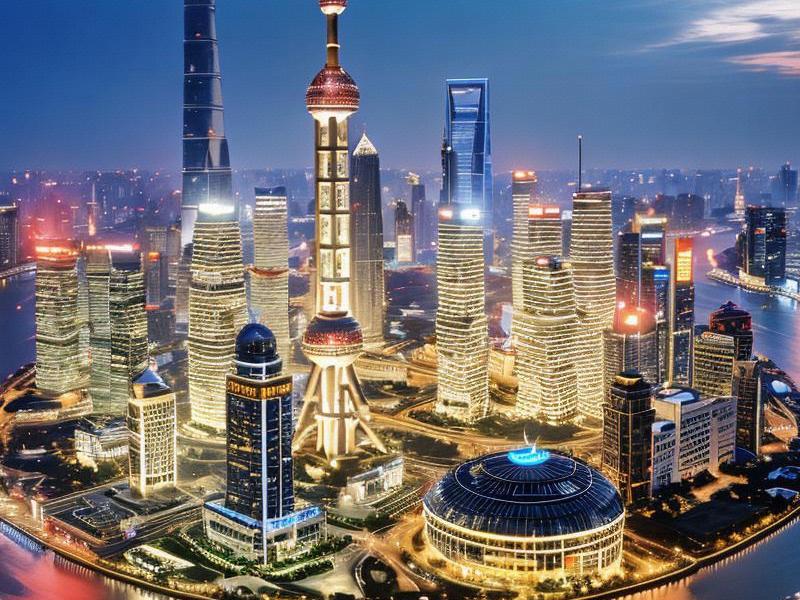
In the heart of China, where the mighty Yangtze River meets the East China Sea, lies Shanghai, a city that has long been synonymous with modernity, progress, and global influence. As the largest city in China and a pivotal member of the Yangtze River Delta (YRD) region, Shanghai is not just a city; it is a symbol of China's economic prowess and a beacon of cultural exchange.
The Yangtze River Delta region, encompassing Shanghai, Jiangsu, and Zhejiang provinces, is one of the most economically vibrant areas in the world. This region, often referred to as "China's economic engine," contributes significantly to the nation's GDP and is home to some of the country's most advanced industries and innovative enterprises. At the core of this economic powerhouse lies Shanghai, a city that has played a pivotal role in the region's development and continues to shape its future.
A Cultural Melting Pot
Shanghai's cultural significance is deeply rooted in its history as a port city. Since its opening to foreign trade in the mid-19th century, Shanghai has been a melting pot of cultures, absorbing influences from China's hinterland and the international community. This unique blend of Chinese and Western cultures is evident in the city's architecture, cuisine, art, and lifestyle.
The Bund, a historic waterfront area in Shanghai, stands as a testament to the city's colonial past. Once lined with grand buildings of various architectural styles, the Bund offers a glimpse into the city's cosmopolitan history. Today, it is a popular tourist destination, where visitors can admire the stunning skyline of Pudong across the Huangpu River and enjoy the vibrant nightlife.
Shanghai's cultural scene is also enriched by its numerous museums, art galleries, and theaters. The Shanghai Museum, renowned for its extensive collection of Chinese art, attracts millions of visitors each year. The city's vibrant art scene, with galleries like the Power Station of Art and the M50 Creative Park, showcases contemporary works from both Chinese and international artists.
夜上海最新论坛 Economic Innovation and Leadership
Shanghai's economic significance cannot be overstated. As China's financial hub, the city is home to the Shanghai Stock Exchange, one of the largest stock exchanges in the world. The city's well-developed infrastructure, including its advanced transportation network, international airports, and efficient port facilities, makes it a key player in global trade and commerce.
The Pudong New Area, developed in the late 20th century, is a symbol of Shanghai's economic transformation. Once a rural area, Pudong has been transformed into a modern metropolis, housing some of the world's tallest skyscrapers, including the iconic Oriental Pearl Tower and the Shanghai Tower. This area is a hub for finance, technology, and innovation, attracting multinational corporations and startups alike.
Shanghai's role in the Yangtze River Delta region is crucial. The city serves as a gateway for trade and investment, connecting the region to the rest of the world. Its strategic location and well-developed infrastructure make it an ideal center for regional integration and collaboration. The city's leadership in economic policy and innovation has set a benchmark for other cities in the region to follow.
Regional Integration and Development
上海私人外卖工作室联系方式 The Yangtze River Delta region's economic success is largely attributed to the integration and collaboration among its cities. Shanghai plays a pivotal role in this regional development, acting as a leader and facilitator. The city's efforts to promote regional integration are evident in various initiatives, such as the establishment of the Yangtze River Delta Integration Development Plan.
This plan aims to enhance the connectivity and cooperation among the cities in the region, fostering a more integrated and efficient economic zone. Key areas of focus include infrastructure development, industrial upgrading, environmental protection, and social welfare. Shanghai's leadership in these initiatives is crucial in ensuring the region's sustainable and inclusive growth.
One of the significant projects under this plan is the construction of the Shanghai-Suzhou-Nanjing High-Speed Railway, which connects the three major cities in the region. This railway not only reduces travel time but also promotes the movement of people and goods, enhancing regional connectivity and economic integration.
Challenges and Opportunities
Despite its successes, Shanghai and the Yangtze River Delta region face several challenges. Rapid urbanization has led to issues such as traffic congestion, environmental degradation, and housing shortages. The city's leadership is actively addressing these challenges through innovative solutions and sustainable development practices.
上海品茶网 One of the key strategies is the promotion of green and smart cities. Shanghai is investing in renewable energy, public transportation, and digital infrastructure to reduce its carbon footprint and improve the quality of life for its residents. The city's efforts in smart city development, including the use of big data and artificial intelligence, are aimed at enhancing efficiency and sustainability.
The regional integration also presents opportunities for Shanghai to strengthen its position as a global hub. By collaborating with other cities in the Yangtze River Delta, Shanghai can leverage its strengths in finance, technology, and innovation to drive regional growth and competitiveness.
Conclusion
Shanghai's cultural and economic significance in the Yangtze River Delta region is undeniable. As a city that bridges the past and the future, Shanghai continues to shape the region's development and influence China's trajectory. Its rich cultural heritage, economic innovation, and leadership in regional integration make it a vital component of China's economic engine.
As Shanghai looks to the future, its commitment to sustainable development and regional collaboration will be crucial in ensuring the continued success of the Yangtze River Delta region. By addressing challenges and seizing opportunities, Shanghai can continue to serve as a beacon of progress and a model for other cities around the world.
In conclusion, Shanghai's role in the Yangtze River Delta region is multifaceted, encompassing cultural exchange, economic leadership, and regional integration. The city's unique blend of history and modernity, coupled with its strategic location and innovative spirit, makes it a key player in China's economic and cultural landscape. As the region continues to evolve, Shanghai's influence will undoubtedly grow, solidifying its status as a global powerhouse.
